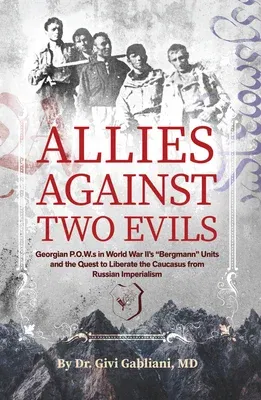An eye-witness account of the Russian/European conflict at the heart
of WWII, relevant today as war rages again along similar battle lines in
Ukraine, Crimea and the Caucasus.
Dr. Givi Gabliani, a Georgian exile from a noble family living in the
United States since the 1950s, recounts his conscription into the Red
Army as a young man shortly after his father was killed in Stalin's
purges, and his coordinated efforts in the "Bergmann" Unit. These
mountain troops, uniquely composed of fellow POWs from the Caucasus,
fought against Stalin's forces on the Eastern Front in Ukraine and
Crimea. Their goal: to liberate their homelands. Gabliani finds unlikely
allies among a group of German officers in the German Resistance, some
later executed after their failed plot to assassinate Hitler, who
promise to support Georgian Independence.
Gabliani envisions a future Europe supporting a trans-Caucasian alliance
with mixed races and religions living together equally in tolerance and
prosperous harmony, as they had for millennia in Georgia. As a spokesman
for the POWs, he coordinates with the Georgian exile government in
occupied Paris and Berlin, finding a secret effort afoot in occupied
France to save Georgian and other Eastern European Jews.
With a new Introduction by Georgian-German scholar Alexander Kartozia,
Gabliani's war memoir centers our attention on an active fault line.
Across the great conflicts of the twentieth century that undergird and
still define the region between Russia, with its imperialist ambitions,
and the Black Sea, Georgia and the Georgian people appear as some of the
most likely partners for international efforts toward peace.

